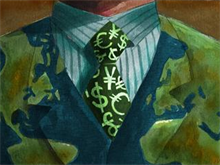 美国参众两院硬是把美国拖入了技术性“坠崖”才达成避免财政悬崖的协议,让我们盯着彼岸的国会山从年尾到新年。全球最大债券基金公司PIMCO首席执行官Mohamed A. El-Erian认为,这恰恰体现出混乱的政局仍是经济发展的主要动力。
美国参众两院硬是把美国拖入了技术性“坠崖”才达成避免财政悬崖的协议,让我们盯着彼岸的国会山从年尾到新年。全球最大债券基金公司PIMCO首席执行官Mohamed A. El-Erian认为,这恰恰体现出混乱的政局仍是经济发展的主要动力。
展望2013年,El-Erian预计,政治与经济之间可能继续保持鲜明的密切关系。在意大利、日本和美国等国,政治仍是经济政策的主要动因,而中国、埃及、德国以及希腊等国正相反,经济成为决定政治成果的关键因素。
这意味着,今年全球将变得更加多样,至少有两种发展方式,一是缺少统一的政治主题,二是多种增长速度与变化的财政状况将产生影响。后一种方式意味着多变政策互动可能有多种走向。
因此,国内国际政治与经济的互动方式对2013年及此后都很重要。它可能出现三大趋势:
经济与政治表现良好就为增长提供了基础,全球经济会更合作。
经济表现不佳,政治功能失调,两者相互影响产生巨大破坏。
勉强过关,政治与经济发展出现冲突,全球形势越来越不稳定,最终没有明确的结果和方向。
到底会怎样发展?El-Erian认为取决于中国、德国和美国的发展。这三国的经济与政治稳定对全球经济至关重要。
先看中国。
El-Erian指出,中国新一届领导人的信誉大部分取决于经济是否能稳扎稳打地软着陆。假如增长长期低于7%,就可能引起城乡各阶层反对。
接着说德国。
El-Erian认为,德国总理默克尔成功地让德国经济避免了欧洲其他地区混乱的冲击。
德国掌握着欧元区的统一与一体化的关键,也是欧元区金融稳定的舵手。德国今年的领导层变化将令人质疑欧洲能否有政策支撑。
最后是美国。
El-Erian称,美国国会继续两党对立,政策不确定性也就持续存在,由此阻碍经济增长。国会无法正常发挥职能将使美国经济表现不及实际水平。长此以往,潜在产出也将减少。
El-Erian也提到了日本与意大利。
意大利的问题是,民选政府能否保持目前的经济立场,是否将转变为德国和欧洲央行不能接受的态度,
蒙蒂如果离新的权力核心越远,改变当前政策的压力就越大。欧盟与德国会更加担忧。
而日本新政府已经表现出货币宽松的态度,将倚重直接控制财政政策和向日本央行施压促进增长与推升通胀。
日本官方这期间将不断让日元贬值,也会减少日本对出口的依赖,改变将生产转移到廉价劳动力所在国家的做法。
至于其他国家。El-Erian预计经济将决定政治。希腊与埃及就是例子。
这两个国家的经济困难可能加剧国内社会动荡,民众不会等到选举再爆发。
Watching America’s leaders scramble in the closing days of 2012 to avoid a “fiscal cliff” that would plunge the economy into recession was yet another illustration of an inconvenient truth: messy politics remains a major driver of economic developments.
In some cases during 2012, politics was a force for good: consider Prime Minister Mario Monti’s ability to pull Italy back from the brink of financial turmoil. But, in other cases, like Greece, political dysfunction aggravated economic problems.
Close and defining linkages between politics and economics are likely to persist in 2013. Having said this, we should also expect much greater segmentation in terms of impact – and that the consequences will affect both individual countries and the global system as a whole.
In some countries – for example, Italy, Japan, and the United States – politics will remain the primary driver of economic-policy approaches. But elsewhere – China, Egypt, Germany, and Greece come to mind – the reverse will be true, with economics becoming a key determinant of political outcomes.
This duality in causation speaks to a world that will become more heterogeneous in 2013 – and in at least two ways: it will lack unifying political themes, and it will be subject to multi-speed growth and financial dynamics that imply a range of possible scenarios for multilateral policy interactions.
With an election looming in Italy, the country’s technocratic interim administration will return the reins of power to a democratically elected government. The question, both for Italy and Europe as a whole, is whether the new government will maintain the current economic policy stance or shift to one that is less acceptable to the country’s external partners (particularly Germany and the European Central Bank).
Monti may or may not be involved in the new government. The further removed from it he is, the greater the temptation will be to alter the policy approach in response to popular pressures. This would involve less emphasis on fiscal and structural reforms, raising concerns in Berlin, Brussels, and Frankfurt.
Japan’s incoming government has already signaled an economic-policy pivot, relying on what it directly controls (fiscal policy), together with pressure on the Bank of Japan, to relax the monetary-policy stance, in an effort to generate faster growth and higher inflation. In the process, officials are weakening the yen. They will also try to lower Japan’s dependence on exports and rethink sending production facilities to lower-wage countries.
The economic impact of politics in the US, while important, will be less dynamic: absent a more cooperative Congress, politics will mute policy responses rather than fuel greater activism. Continued congressional polarization would maintain policy uncertainty, confound debt and deficit negotiations, and impede economic growth. From stymieing medium-term fiscal reforms to delaying needed overhauls of the labor and housing markets, congressional dysfunction would keep US economic performance below its capacity; over time, it would also eat away at potential output.
In other countries, the causal direction will run primarily from economics to politics. In Egypt and Greece, for example, rising poverty, high unemployment, and financial turmoil could place governments under pressure. Popular frustration may not wait for the ballot box. Instead, hard times could fuel civil unrest, threatening their governments’ legitimacy, credibility, and effectiveness – and with no obvious alternatives that could ensure rapid economic recovery and rising living standards.
In China, the credibility of the incoming leadership will depend in large part on whether the economy can consolidate its soft landing. Specifically, any prolonged period of sub-7% growth could encourage opposition and dissent – not only in the countryside, but also in urban centers.
Then there is Germany, which holds the key to the integrity and unity of the eurozone. So far, Chancellor Angela Merkel has been largely successful in insulating the German economy from the turmoil elsewhere in Europe. Unemployment has remained remarkably low and confidence relatively high. And, while growth has moderated recently, Germany remains one of Europe’s best-performing economies – and not just its paymaster.
While some would have favored greater policy activism, Merkel’s Germany has provided a steady anchor for a eurozone struggling to end bouts of financial instability and put an end to questions about its survival as a well-functioning monetary union (one that aspires to becoming much more). A change in German leadership would, therefore, raise questions about Europe’s policy underpinning.
How politics and economics interact nationally and globally is one of the important questions for 2013 and beyond. There are three scenarios: good economics and effective politics provide the basis for a growing and more cooperative global economy; bad economics interact with dysfunctional politics to ruin the day; or the world muddles through, increasingly unstable, as a tug of war between economics and politics plays out, with no clear result or direction.
Part of the answer depends on what happens in three countries in particular – China, Germany, and the US. Their economic and political stability is essential to the well-being of a world economy that has yet to recover fully from the 2008 global financial crisis.
Current indications, albeit incomplete, suggest that the three will continue to anchor the global economy in 2013. That is the good news. The bad news is that their anchor may remain both tentative and insufficient to restore the level of growth and financial stability to which billions of people aspire.
 美国参众两院硬是把美国拖入了技术性“坠崖”才达成避免财政悬崖的协议,让我们盯着彼岸的国会山从年尾到新年。全球最大债券基金公司PIMCO首席执行官Mohamed A. El-Erian认为,这恰恰体现出混乱的政局仍是经济发展的主要动力。
美国参众两院硬是把美国拖入了技术性“坠崖”才达成避免财政悬崖的协议,让我们盯着彼岸的国会山从年尾到新年。全球最大债券基金公司PIMCO首席执行官Mohamed A. El-Erian认为,这恰恰体现出混乱的政局仍是经济发展的主要动力。
